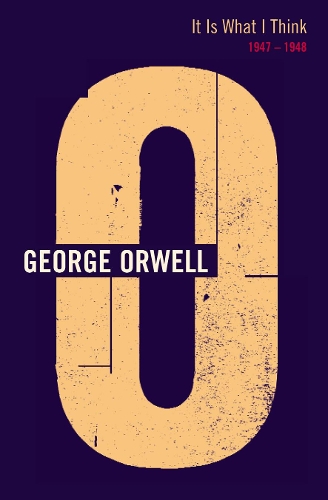
It Is What I Think: 1947 - 1948
(Paperback)
Publishing Details
It Is What I Think: 1947 - 1948
By (Author) George Orwell
Vintage Publishing
Martin Secker & Warburg Ltd
15th November 2002
United Kingdom
Classifications
Tertiary Education
Non Fiction
828.91208
Physical Properties
Paperback
576
Width 153mm, Height 234mm, Spine 40mm
739g
Description
Volume 19 of The Complete Works of George Orwell Volume 19 of The Complete Works of George Orwell Much of 1947 and 1948 was taken up with Orwell's struggle to complete Nineteen Eighty-Four and his fight against illness. He wrote 'Arthur Koestler', 'Lear, Tolstoy and the Fool', and his last contribution to Tribune, his eightieth 'As I Please'. The second half of 1948 was spent at Jura where, by a supreme effort, and often in great pain, he managed to complete Nineteen Eighty-Four. He was admitted to hospital and continued to work on 'Such, Such Were the Joys'; among the essays he wrote were 'Towards European Unity', 'Profile of Krishna Menon', 'Writers and Leviathan', 'Britain's Left-Wing Press', 'George Gissing', 'Britain's Struggle for Survival- The Labour Government after Three Years', and 'Marx and Russia'; and he continued to review. Changes made in the course of the production of Orwell's radio version of Animal Farm are listed; his second Literary Notebook is reproduced and his third series of notes for his literary executor. This volume is rich in previously unpublished correspondence and includes Fredric Warburg's and David Farrer's reports on Nineteen Eighty-Four. Orwell's attempt to secure justice for those unfairly treated is also well illustrated.
Reviews
The edition is a national treasure -- Michael Shelden * Daily Telegraph *
One of the great triumphs of late 20th-century publishing -- D J Taylor * Independent *
Author Bio
Eric Arthur Blair - better known as George Orwell - was born on 25 June 1903 in Bengal. He was educated at Eton and then served with the Indian Imperial Police in Burma. He lived in Paris for two years, and then returned to England where he worked as a private tutor, schoolteacher and bookshop assistant. He fought on the Republican side in the Spanish Civil War and was wounded in the throat. During the Second World War he served as Talks Producer for the Indian Service of the BBC and then joined Tribune as its literary editor. He died in London in January 1950.
